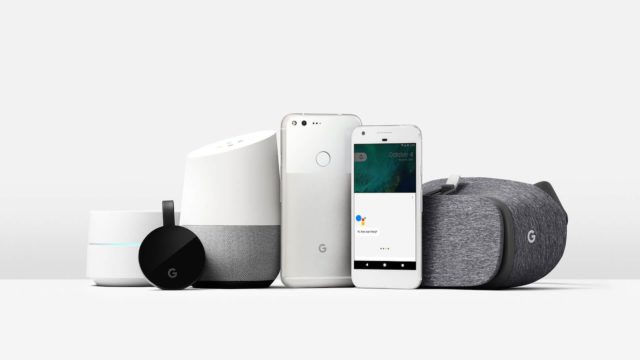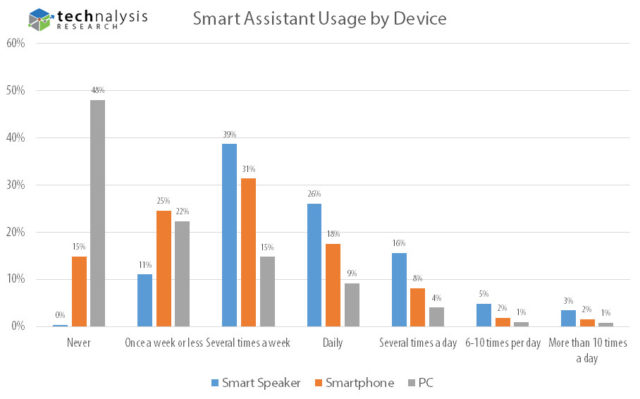If you haven't noticed yet: the OS platform opposition is over.

And yes, no one actually won, by and large all the big players became winners. Google boasts the largest number of users of its OS, Apple gets the most profit from iOS, and Windows still 'dominates' jobs, keeping the lead in this area Microsoft However, the next battle is coming up in the tech world and the stakes are higher than ever. This time, digital assistants such as Alexa (Amazon), Siri (Apple), Cortana (Microsoft) and Google Assistant (coming soon time also goes to iOS). Undoubtedly, most of the attention was initially focused on the capabilities of voice control of computing processes, but I believe that the functionality of assistants will expand to text chatbots, stand-alone software AI assistants and, more importantly, actually turn them into a kind of digital gateways that as a result, a variety of 'smart' and connected devices will be interconnected.
From smart homes and cars, smartphones, PCs, and wearable electronics to our personal lives and work, these assistants (ideally) provide a strong link between computing, services, and more across multiple disparate operating system platforms. In short: they can make our lives more organized, and our devices and services easier to use. That is why such assistants are so strategically important and that is why so many companies (from Facebook to Samsung) are working on their own variations of such software.
Another fascinating aspect of this technology is the potential to completely devalue the value of the original platform that assistants run on. If I can, for example, use Alexa on both iPhone and a PC with Windows, as well as smart home devices and (in the future) in a 'connected' car, then what comes with unique benefits iOS or Windows 10? They cease to exist.
Realizing the overarching importance and observing the distance from platforms, I regard such assistants as exceptional examples of a 'meta-platform' that provides the potential for expansion through both APIs for developing new software and connecting a conventional platform, but outside the traditional OS.
With that thought in mind, take a look at the recent Technalysis Research study of thousands of American users on the use of digital assistants on smartphones, PCs, and the newest entrants in the technology race – smart speakers. As mentioned earlier, digital assistants as they are today are for the most part focused on voice control and applications focused on simple voice requests. To better understand the use cases for assistants, respondents were asked how often (if any) they use digital assistants on smart speakers, smartphones and PCs. The result can be seen in the table below.

Striking fact: Despite the fact that the category of smart speakers is relatively new (Echo is less than two years old), and Siri was released in 2011, it is becoming clear that people with access to smart speakers (14% of households in the US) I use digital assistants much more often than smartphone owners.
Yes, it tempts to assume that such numbers are due to the perceived accuracy of various assistants, but if you raise the question of accuracy, then the ratings for Alexa, Siri and Google Assistant were almost identical, there was no one leader. Instead, the results show that a dedicated device installed in the center of the home is simply getting people to use it more. If you want to be a relevant company at this early stage of the digital assistant battle, then you need to offer the user a dedicated smart speaker.
Another challenge is the necessity for many users to use several digital assistants from different manufacturers. In fact, 56% of those surveyed confirmed that they use multiple assistants from time to time, with different attitudes towards the need to switch between them. Those in the largest group (26%) swear loyalty to a single assistant and ignore others, but it's time to test their loyalty.
Digital assistants still have a lot ahead of them, and current use cases are just a bit of a mystery over their long-term potential. Be that as it may, it is clear that the meta-platform battle for digital assistants will be much larger and have a longer lasting impact than past OS skirmishes. And this in itself makes them obligatory to study and understand.
Original material by Bob O'Donnell
Everything seems to be good as presented by the author, but in his reasoning on the abandonment of platforms, an important point, in my opinion, is missing: compatibility. Yes, Google Assistant is coming to iOS, but what are the guarantees to reverse the process with Siri? And it is unlikely that the same Apple will agree to use Cortana or Alexa in the newly introduced column. There is a conflict of approaches to openness of software and hardware.
Of course, it would be very nice to have a single 'assistant' for popular devices, but so far it all sounds utopian. Plus, reviews from users of smart speakers, on the contrary, hint at attachment to a particular platform. Do you think digital assistants can erase platform boundaries?
